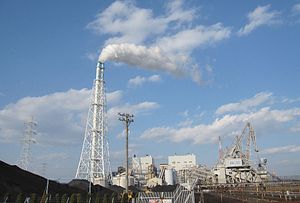The United Nations climate conference (COP28) in Dubai is drawing to a close and negotiators have days to secure a global agreement on climate change. On the first day of the summit, Japanese Prime Minister Kishida Fumio was eager to showcase the country’s contribution to climate action by declaring that no new domestic coal-fired power plants will be built without measures to reduce carbon dioxide emissions. But rather than cutting its reliance on fossil fuels, Japan’s path to lower emissions is pinned on industry decarbonization through controversial new technology.
In 2020 Japan set an ambitious target of achieving net carbon neutrality by 2050. Earlier this year the government unveiled a new green transformation strategy called “GX,” which positions decarbonization as a way to propel economic growth and secure stable energy supplies. Decarbonization aims to limit greenhouse gas (GHG) emissions through the use of low carbon sources. Japan is currently pioneering a new energy generation method in which coal is co-fired with ammonium, which does not produce carbon dioxide emissions during combustion. Japan also backs the development of coal-fired power plants equipped with Carbon Capture, Usage, and Storage (CCUS) technology.
Coal is the dirtiest fuel. It emits hundreds of times more GHGs compared to nuclear, solar, and wind energy. Subsequently, phasing out coal globally has dominated discussions at COP28. Yet, 41 percent of Japan’s total energy mix for 2030 is set to come from coal, followed by 36 to 38 percent from renewable sources and 20 to 22 percent from nuclear power plants. In Japan’s defense, it says it is on track to achieve a 46 percent reduction in GHG emissions by 2030
Asia accounts for half the world’s carbon dioxide emissions, but some countries are reluctant to meet strict rules for decarbonization. In his debut COP28 speech, Kishida vowed to lead Asia through the decarbonization process. Japan will host a carbon reduction summit with the Association of Southeast Asian Nations later this month. Under a new concept called Asia Zero Emissions Community (AZEC), Kishida said Japan will help facilitate an energy transition in Asia tailored around each country’s circumstances.
However, international environmental group Climate Action Network (CAN) says Japan’s proposed technology is far from clean, accusing Japan of “greenwashing” and “missing the point.” CAN said Japan’s efforts to help Asia transition to clean coal through its AZEC initiative is prolonging the life of coal and gas. The combination of coal with ammonia or hydrogen is Japan’s signature technology, but is still in a trial phase and commercialization is expected to take years.
Critics argue that ammonia and hydrogen are costly alternatives, which Japan will need to import and secure supply chains for. They said the capital should be instead channeled toward more ambitious renewable targets.
In Dubai, CAN awarded Japan, for the fourth consecutive year, two infamous “Fossil Awards” as a climate change policy laggard.
French President Emmanuel Macron also urged Japan to “put an end” to coal-fired power generation by 2030. Macron said that as a G-7 nation, Japan should set a global standard. However, the Kishida administration is yet to commit to decommissioning coal power plants entirely.
At the summit Kishida emphasized a lack of investment in the decarbonization industry as a major hurdle in cutting global emissions. He pledged increased financial support to aid developing nations to tackle climate change. Japan also promised to establish a new fund within the African Development Bank and expand loan capacity for the World Bank and the Asian Development Bank by approximately $9 billion. A further $10 million will also go toward a new international fund to help developing countries address losses and damage caused by climate change related disasters.
With the COP28 pavilion theme of “Together for Action,” Japan is keen to convince the international community of its efforts to promote decarbonization. Japan’s COP28 pavilion featured exhibitions with Japanese cutting-edge technology for adaptation, energy supply chains, as well as housing and mobility. Kishida is unphased by international criticism and insists global GHG emissions can be reduced by leveraging Japanese technology and finance initiatives.

































